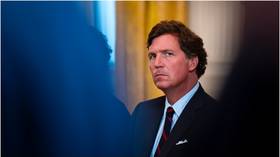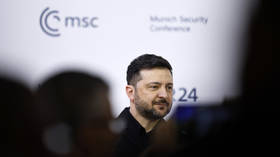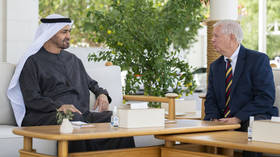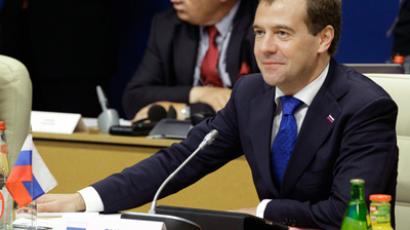US-Russia visa row heats up
The Obama administration has imposed a travel ban on 60 Russian nationals, which Washington alleges are connected to the prison death of lawyer Sergey Magnitsky.
As uncertainties linger over the Obama administration’s commitment to a true “reset” in bilateral relations with Russia, the visa blacklist against dozens of Russian citizens will certainly dirty the diplomatic waters. Washington formally announced plans for its visa blacklist, as well as a move to freeze assets belonging to certain individuals.“Secretary [Hillary Rodham] Clinton has taken steps to ban individuals associated with the wrongful death of Sergey Magnitsky from traveling to the United States,” the Senate document said.“Senior Russian government officials have warned us that they will respond … if this [Senate] legislation passes,” the document reads. "Their argument is that we cannot expect them to be our partner in supporting sanctions against countries like Iran, North Korea, and Libya, and sanction them at the same time."Russian officials have warned that other areas of bilateral cooperation, including on military transit flights to Afghanistan, could suffer from the passage of this legislation."Of course, Russia won't leave without attention such unfriendly acts and will take appropriate measures to protect the sovereignty of the country and its' citizens against the unlawful acts of foreign states," the Russian Ministry of Foreign Affairs said in a terse statement on Wednesday. The head of the Russian Presidential Council for Human Rights Mikhail Fedotov on Tuesday said that the so called Magnitsky case was primarily Russia’s internal affair, and warned that the US black list could have undesired consequences."The idea of fighting crime and corruption in Russia is primarily our concern," Fedotov said in an interview with the Interfax news agency. "For us, it is crucial that all those who are really responsible end up on the 'Magnitsky list' at the Russian, and not the U.S. border. We are doing everything we can to make sure that the people from this list are eventually barred not only from traveling to America, but also from leaving the country in any manner. They should also “stand trial,” Fedotov went on to say. But the Russian HR official said that U.S. blacklists could prompt retaliatory measures from Russia. "We understand the noble goals. But one also needs to see the potentially unpleasant consequences. This step can generate retaliatory visa restrictions on the part of Russia,” Fedotov said. "When a country establishes visa restrictions against another – it is, of course, its sovereign right, but it is thus provoking the other side to set symmetrical restrictions. This appears to me to be extremely counter-productive. Russia stated very openly and clearly that it is looking to have all visa restrictions lifted," the official said.Meanwhile, Moscow was warned against outside pressure being exerted in the case of the 37-year-old lawyer who died while in pretrial detention. Investigators alleged that Sergey Magnitsky had conspired with William Browder, who has reportedly been banned from entering Russia, to set up dummy front firms to illegally buy and sell shares in Russian energy giant Gazprom. In November 2009, Magnitsky died in prison following complications from an apparent case of pancreatitis. This month, the authorities announced prison doctors would be prosecuted for neglecting to provide the appropriate medical care for Magnitsky while he was being detained.The head of the Federal Penitentiary Service said last year that the service was partially responsible for the death of the lawyer.Following Magnitsky's death, President Dmitry Medvedev put a law on the fast track that allows individuals suspected of “white collar crimes,” as they are referred to in the West, to be released on bail as determined by the courts. Prime Minister Vladimir Putin called the death a "tragedy."Meanwhile, the Russian State Duma, or lower house, has been considering a bill that would target US officials with similar sanctions, referring to the extradition of Russian citizens from third-party countries.In 2010, alleged arms dealer Viktor Bout, a Russian citizen, was extradited to the United States following a lengthy legal battle in Thailand. Bout, who has been the inspiration for at least one Hollywood film, now faces an uphill struggle to prove his innocence in the US court system.Moscow expected to deliver harsh response At least one lawmaker, Leonid Slutsky, first deputy head of the State Duma Committee for International Affairs, says Russia's response to the sanctions imposed by the US State Department must be tough. "Of course, our response must be tough and harsh," Slutsky told Interfax on Wednesday,commenting on reports that the US State Department has obtained the right to refuse US entry visas to the Russian officials it believes to be responsible for the death of Sergey Magnitsky while in detention. "Under the Immigration and Nationality Act (INA), the Department is required to deny visas to individuals involved in human rights violations, such as torture and extra-judicial killings," aState Department official told Interfax. "Certainly, the Russian diplomatic mission will give its tough assessment to this decision, when we receive its formal confirmation,” Slutsky said. “It could happen as early as today." Slutsky said the Russian diplomatic community understood that the move by the US is a “provocation,” that “unfortunately finds support among high governmental circles in the West, and primarily in the US proper.""We must not yield to provocations,” he stressed, while saying that "Russia must give the toughest possible, but measured response." The First Deputy Head of the Duma Committee for International Affairs then mentioned the Russian-US reset, put into motion by Russian President Dmitry Medvedev and his American counterpart, Barack Obama, which could be jeopardized by Washington’s gamble.Such actions by the U.S. State Department, "if formally proved," conflict with the reset process in the U.S.-Russian relations, he said.At the same time, Slutsky noted that cooperation between Russia and the US is growing, and as damaging as the American actions may be, would probably not succeed at reversing current tendencies."Of course, this reset is haphazard, but it is still proceeding, and as the chairman of the Russian peace foundation I can confirm: the constructive cooperation between the two countries' civil societies is growing," Slutsky acknowledged.He then warned of the dangers of allowing certain politicians to disrupt this process."At times, even less significant events led to all sorts of cold and hot wars.Under no circumstancesshould we allow a disruption of the reset in the relations between our countries," Slutsky said. It is vital that we temper our words and actions so as not to wreck the reset process, thus “taking our countries back to the threshold of the Cold War." he continued.Robert Bridge, RT
Read related Vyacheslav Nikonov's column here














